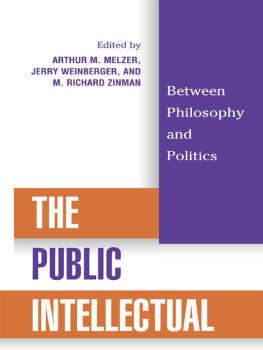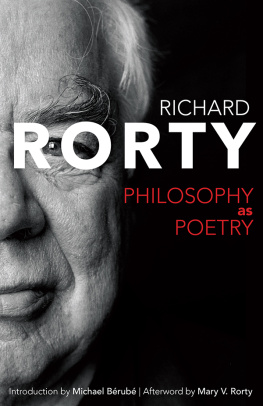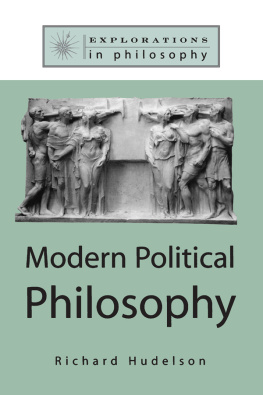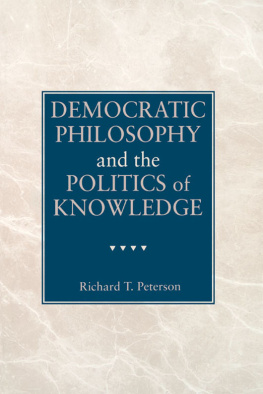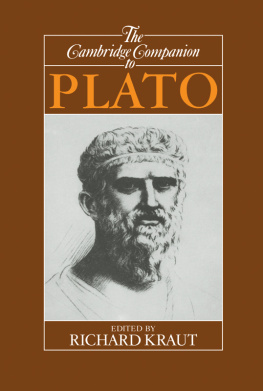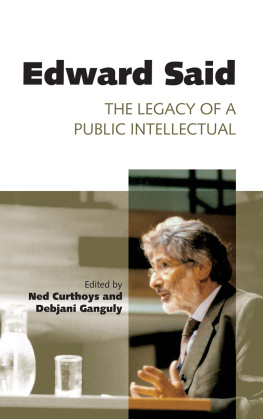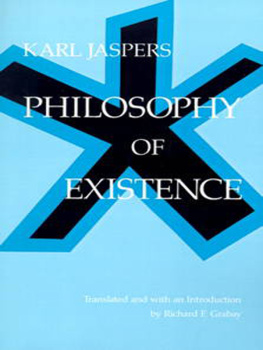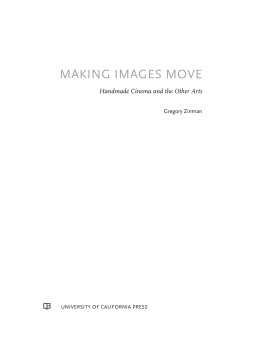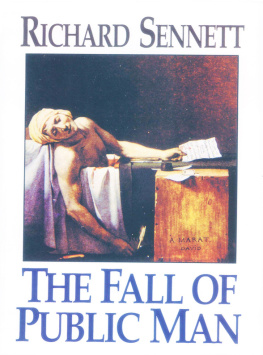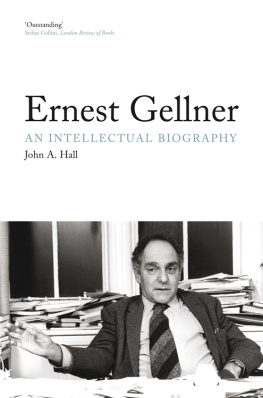Zinman M. Richard - The public intellectual: between philosophy and politics
Here you can read online Zinman M. Richard - The public intellectual: between philosophy and politics full text of the book (entire story) in english for free. Download pdf and epub, get meaning, cover and reviews about this ebook. City: Lanham, MD, year: 2003, publisher: Rowman & Littlefield Publishers, genre: Politics. Description of the work, (preface) as well as reviews are available. Best literature library LitArk.com created for fans of good reading and offers a wide selection of genres:
Romance novel
Science fiction
Adventure
Detective
Science
History
Home and family
Prose
Art
Politics
Computer
Non-fiction
Religion
Business
Children
Humor
Choose a favorite category and find really read worthwhile books. Enjoy immersion in the world of imagination, feel the emotions of the characters or learn something new for yourself, make an fascinating discovery.
- Book:The public intellectual: between philosophy and politics
- Author:
- Publisher:Rowman & Littlefield Publishers
- Genre:
- Year:2003
- City:Lanham, MD
- Rating:5 / 5
- Favourites:Add to favourites
- Your mark:
- 100
- 1
- 2
- 3
- 4
- 5
The public intellectual: between philosophy and politics: summary, description and annotation
We offer to read an annotation, description, summary or preface (depends on what the author of the book "The public intellectual: between philosophy and politics" wrote himself). If you haven't found the necessary information about the book — write in the comments, we will try to find it.
The public intellectual: between philosophy and politics — read online for free the complete book (whole text) full work
Below is the text of the book, divided by pages. System saving the place of the last page read, allows you to conveniently read the book "The public intellectual: between philosophy and politics" online for free, without having to search again every time where you left off. Put a bookmark, and you can go to the page where you finished reading at any time.
Font size:
Interval:
Bookmark:
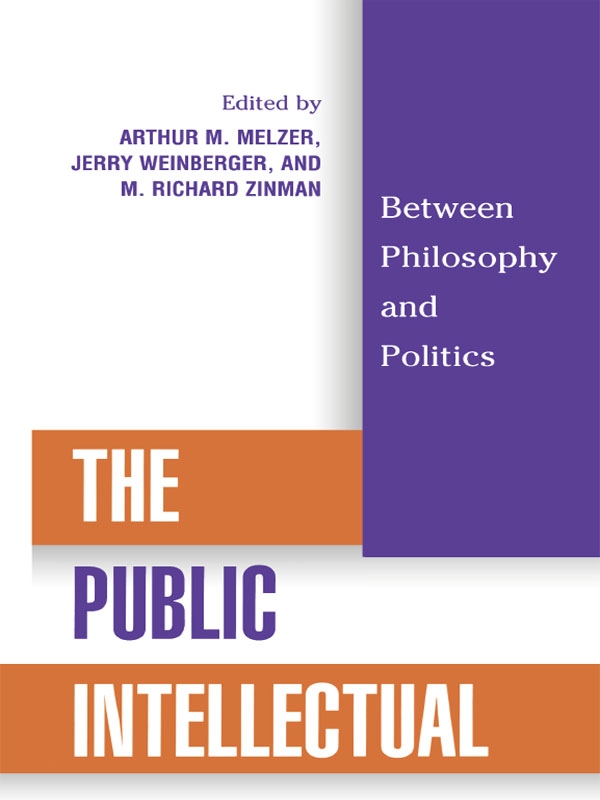
This is the sixth volume of essays to be published by the Symposium on Science, Reason, and Modern Democracy. Established in 1989 in the Department of Political Science at Michigan State University, the symposium is a center for research and debate on the pressing political and intellectual issues of our time. It sponsors lectures, conferences, publications, and teaching, as well as graduate, postdoctoral, and senior fellowships. Its specific mission is to explore the intersection of public policy and philosophy: to study the problems of Americas political culture in their vital connection to Americas intellectual culture.
This volume grew from the symposiums eighth annual program, The Idea of Public Intellectual, a lecture series and a conference held at Michigan State during the 19961997 academic year. The conference was organized by the symposium and the Center for Theoretical Study, an institute of advanced studies jointly administered by Charles University and the Academy of Sciences of the Czech Republic. It was designed to celebrate the twentieth anniversary of Charter 77, the human rights movement founded by dissident Czech and Slovak intellectuals that prepared the way for the Velvet Revolution.
In planning the conference, we worked closely with Martin Palou, then senior research fellow at the Center for Theoretical Study and now ambassador of the Czech Republic to the United States. We thank Ambassador Palou for his essential contribution to our joint enterprise. We also thank Ivan M. Havel, director, and Ivan Chvatk, codirector, of the center, and their colleagues, especially Josef Moural, for their valuable support.
Most of the essays collected in this volume were originally written for the symposiums 19961997 program. Eight are published here for the first time. Versions of five others have appeared elsewhere. A different version of Thomas Pangles essay appeared in Canadian Political Philosophy at the Turn of the Century: Exemplary Essays, ed. R. Beiner and W. Norman (New York: Oxford University Press, 2000). A much earlier version of Gordon Woods chapter was published in Leadership in the American Revolution (Washington: Library of Congress, 1974). Tony Judts essay appeared in his book The Burden of Responsibility: Blum, Camus, Aron, and the French Twentieth Century (Chicago: University of Chicago Press, 1998). Various versions of Adam Michniks chapter have appeared in print. Martha Nussbaums chapter was published in Ethics 108, no. 4 (July 1998): 76296. We thank these contributors and their publishers for permission to reprint.
The symposiums 19961997 program and all its activities were made possible by grants from the Lynde and Harry Bradley Foundation of Milwaukee, Wisconsin; the Carthage Foundation of Pittsburgh, Pennsylvania; the Earhart Foundation of Ann Arbor, Michigan; and the John M. Olin Foundation of New York City. Once again, we are grateful for their support.
Michigan States Department of Political Science has been home to the symposium since its founding. Michigan States College of Social Science and James Madison College have also aided us in many ways. We thank our colleagues in each of these institutions. In particular, we thank Phil Smith, former acting dean of the College of Social Science; Brian Silver, former chair of the Department of Political Science; William Allen, former dean of James Madison College; Werner Dannhauser, the symposiums senior research fellow; and Larry Cooper, the symposiums postdoctoral fellow for 19961997 for their special contributions during our eighth year. We also thank John Hudzik, dean of Michigan States International Studies and Programs, and Norman Graham, director of Michigan States Center for European and Russian Studies, for their support of the conference in East Lansing. As always, we are especially grateful to Karen Battin, the symposiums administrative coordinator, for her fine work.
In addition to the authors whose essays are included in this volume, the following individuals took part in the symposiums 19961997 program: Stanley Crouch, John Gray, Mikls Haraszti, Ivan Havel, Krysztof Jasiewicz, Martin Palou, G. M. Tams, Vladimir Tismaneanu, and Ivan Vejvoda. We thank them for their important contributions.
Saul Bellow is University Professor and Professor of English at Boston University. He was awarded the Nobel Prize in Literature in 1976 and received the National Book Award in 1953, 1964, and 1971. His most recent novels are Deans December (1998) and Ravelstein (2000).
John Patrick Diggins is Distinguished Professor of History at the Graduate Center of the City University of New York. His books include Max Weber Politics and the Spirit of Tragedy (1996) and On Hallowed Ground: Abraham Lincoln and the Foundations of American History (2000).
Pierre Hassner is senior research associate at the Centre dEtudes et de Recherches Internationales and professor at the Institut dEtudes Politiques in Paris. He is the author of Totalitarismes (with Guy Hermet and Jacques Rupnik) (1984) and Violence and Peace: From the Atomic Bomb to Ethnic Cleansing (1997).
Josef Joffe is editor and publisher of Die Zeit and associate of the Olin Center for Strategic Studies at Harvard University. His books include Limited Partnership: Europe, the United States, and the Burdens of Alliance (1987) and The Great Powers (1998).
Tony Judt is Erich Maria Remarque Professor of European Studies and director of the Remarque Institute at New York University. His most recent books are A Grand Illusion? An Essay on Europe (1996) and The Burden of Responsibility: Blum, Camus, Aron, and the French Twentieth Century (1998).
Ira Katznelson is Ruggles Professor of Political Science at Columbia University. His books include Marxism and the City (1992) and Liberalisms Crooked Circle: Letters to Adam Michnik (1996).
Christopher Kelly is professor of political science at Boston College. He is the author of Rousseaus Exemplary Life: The Confessions as Political Philosophy (1987) and the editor (with Roger D. Masters) of The Collected Writings of Rousseau (eight volumes to date).
Arthur M. Melzer is professor of political science at Michigan State University. He is the author of The Natural Goodness of Man: On the System of Rousseaus Thought (1990). He is codirector of the Symposium on Science, Reason, and Modern Democracy and an editor of its first five volumes of essays, the most recent of which is Politics at the Turn of the Century (2001).
Adam Michnik is editor in chief of the Gazeta Wyborcza. His works include Letters from Prison and Other Essays (1985) and Letters from Freedom: PostCold War Realities and Perspectives (1998).
Martha C. Nussbaum is Ernst Freund Distinguished Service Professor of Law and Ethics at the University of Chicago Law School. Her most recent books are Women and Human Development: The Capabilities Approach (2000) and Upheavals of Thought: The Intelligence of Emotions (2001).
Thomas L. Pangle is University Professor of Political Science at the University of Toronto. His books include The Learning of Liberty: The Educational Ideas of the American Founders (with Lorraine Smith Pangle) (1993) and Justice among Nations: On the Moral Basis of Power and Peace (with Peter Ahrensdorf) (1999).
Paul A. Rahe is Jay P. Walker Professor of American History at the University of Tulsa. He is the author of Republics, Ancient and Modern: Classical Republicanism and the American Revolution (1994).
Jerry Weinberger is professor of political science at Michigan State University. His books include Science, Faith, and Politics: Francis Bacon and the Utopian Roots of the Modern Age (1985) and new editions of Bacons History of the Reign of King Henry the Seventh (1996) and The Advancement of Learning (2001). He is the director of the LeFrak Forum, codirector of the Symposium on Science, Reason, and Modern Democracy, and an editor of the symposiums first five volumes of essays.
Font size:
Interval:
Bookmark:
Similar books «The public intellectual: between philosophy and politics»
Look at similar books to The public intellectual: between philosophy and politics. We have selected literature similar in name and meaning in the hope of providing readers with more options to find new, interesting, not yet read works.
Discussion, reviews of the book The public intellectual: between philosophy and politics and just readers' own opinions. Leave your comments, write what you think about the work, its meaning or the main characters. Specify what exactly you liked and what you didn't like, and why you think so.

